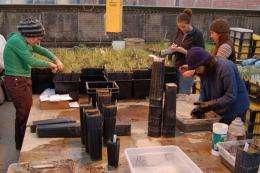Ecologists explore new explanation for plant productivity

(Phys.org) -- Current ecological thought suggests the more diverse a plant community is, the more productive it is. But scientists don’t fully understand why this is so.
“We’re exploring the possibility that plant-soil feedbacks may also be a critical but underappreciated factor in plant community development,” says Andrew Kulmatiski, assistant research professor in Utah State University’s Ecology Center and Department of Plants, Soils and Climate.
Understanding the mechanisms behind productivity has important implications for agriculture, biofuel production and plant community management, he says.
With USU Ecology Center colleagues Karen Beard, associate professor in USU’s Department of Wildland Resources and instructor Justin Heavilin of USU’s Department of Mathematics and Statistics, Kulmatiski published findings in the April 11, 2012 online “FirstCite” edition of Proceedings of the Royal Society B, a publication of the United Kingdom’s academy of sciences. The team’s research is supported by the Utah Agricultural Experiment Station and the National Science Foundation.
“Current explanations suggest plant productivity increases with species diversity because more diverse communities can exploit a wider range of resources and because a diverse community is more likely to contain highly productive species,” Kulmatiski says. “Soil pathogens typically decrease productivity in monocultures and we think this may also explain why more diverse communities are more productive.”
To test their hypothesis, the team developed and tested a novel biomass-specific, multi-species model to examine the role of plant-soil feedbacks in diversity-productivity relationships.
“This allowed us to examine the effects of plant-soil feedbacks on plant productivity and to examine these effects in plant communities with more than three plant species,” Kulmatiski says. “Neither of these kinds of experiments had been done previously.”
The team’s model successfully predicted how different plant species would develop in different plant communities.
“Our results provide conceptual and experimental support for the role of plant-soil feedbacks in diversity-productivity relationships,” Kulmatiski says.
Provided by Utah State University


















